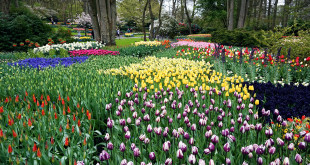I was just reading the news on Expatica and came across another blogger who writes for them. I went to a page that explains who she is exactly and I felt much better after having read it. It made me feel like I’m not completely hopeless after all.
The truth is that I’m not from anywhere in particular any more, though my passport says that I’m Dutch. Judging by my place of birth and upbringing, that’s undeniably true. Going on other criteria, like my values, outlook on life and taste in breakfast, I’m British and proud of it.
… my father became critically ill so I returned to the Netherlands.
I’m an immigrant in my own country. For the first time in all the trials and tribulations of my existence, I’m not managing to build myself a new life. The Holland that I live in is vastly different from the Holland experienced by most expats who come in with a job and a decent income. I came in without a job and 400 job applications later, I’ve still not got one.
This Dutch woman has lived in America, Britain, all over Latin America and even she is having difficulty with life here. She speaks fluent Dutch, is well educated and is actually a citizen of this country, and yet she still feels like an outsider!
Seriously, if someone with all of that going for her is struggling to find a way to live happily in the Netherlands, why on earth do I keep beating myself up about my problems settling in here?
There are some really interesting articles on Expatica that she’s written. I love that she can see the things us ‘real’ foreigners see and experience every day. Especially when it comes to the Dutch attitude towards foreigners and their sometimes rigid way of thinking.
I think this is the best explanation I’ve ever heard of what someone goes through when they move to a new country.
We’re all of us the product of our own cultures … to the extent that we (can) arrive in a new place staunchly believing things to be better back home. Only after many years of immersion into another society do we begin to understand that things are merely different, organized according to non-transferable local circumstances, and not necessarily better. In other words, it’s us migrants who learn and change our beliefs accordingly. Uprooted, we develop a personal culture based on experience rather than blind loyalty. It’s us who blow the wind of change, not the settlers who have no calibration tool for their beliefs.
But even if we are very successful in adapting to our new country, we have no roots there so cannot go the whole hog and end up somewhere in between – at the personal cost of losing our comfortable place back home though not really belonging to the new culture either.
That is exactly what it feels like for me. I came here and after a few months I was convinced I hated it, Canada was much better and I wanted to get the hell out of here. That wasn’t an option if I wanted to stay with Xander so instead I had to learn to adapt, which has been extremely difficult for me.
After living here for 8 years I have grown accustomed to many of the things that I once struggled with, even learned to appreciate many of them… but no matter how much I adjust to life here it still doesn’t feel like home. I’m hoping it will one day but it’s been almost 10 years already, how much longer will it take?
The funny thing is, after being out of Canada for so long and living such a different lifestyle, when I go home I feel this great sense of relief to be around my family and friends, to speak my own language and live in my own culture… but I realize how I’ve changed since I left and don’t feel quite as connected to it as I once did. In a sense I have no real home. I’ve outgrown the small town mentality that I grew up in, and have not quite grown into the broad European mentality. Neither of these countries and cultures are truly home to me anymore.
It’s like I need a little island in the middle of the Atlantic Ocean with Wendy’s, Netflix, high speed Internet, hot fudge sundaes, and cheap flights to all the coolest European destinations. The language would be Dunglish, as Xander calls it… a bizarre mixture of Dutch and English that all the people on the island would understand. Not that there would be a lot of people because it’s a small island and I really don’t dig crowds.
Oops, getting off topic…
She also had a really interesting insight into the Dutch mentality and their ‘good life’.
In The Netherlands, there is a clear consensus, a dominant belief system even – on how to live, no less. Possibly ensuing from the post-WW II reconstruction years, it is a linear, one-dimensional view of being born, getting a good education, a good job, a good husband or wife, good children, a good pension and a good death.
As people who tread this straight and narrow can be seen very clearly indeed to have a ‘good’ life, this notion has come to underpin the entire Dutch society and is at the core of the Dutch identity. And what’s wrong with that? For one, ‘a good life’ tends to be defined in terms of purchasing power and it is from this that the Dutch derive their self-analysis of individualism. Next, people will do anything to protect their wallets.
Not surprisingly, the 2004 Transparency International global corruption barometer mentioned Norway and the Netherlands as the Western nations with the most corrupt private sector. Furthermore, as position and income – by extension one’s performance at work – aren’t open to criticism, Dutch society isn’t open to change. Also, the apple cart’s being upset by influences – immigrants and their ‘norms and values’, EU Directives, UN Treaties – that aren’t exactly non-Dutch in defining ‘good’ in non-monetary terms like quality, integrity, transparency, equality and the like but that definitely require a rethink of the core identity. So the Dutch are closing ranks. Finally, the systems designed to uphold the national identity – education, health and law – are creaking at the seams.
I guess that explains why every Dutch person I meet asks what I do for a living with in the first 30 seconds of conversation. Ok I’m sorry, I’m exaggerating… 45 seconds. They aren’t interested in who I am, what I think, what I like to do for fun, what matters to me in life… they want to know:
1) Where do I come from.
2) What brought me to Holland.
3) What do I do for work.
4) Why don’t I work.
Then the conversation sort of teeters off while they give me that look. The look that says ‘You lazy bitch get out of my country’, and I try not to give the ‘Fuck you and your wooden shoes, who are you to judge me?’ look in return. It’s hard to continue on from there, really.
Now, I’m not saying that North Americans aren’t often obsessed with the almighty dollar, or that they don’t judge themselves and others according to how much money they make and how well connected they are… but that’s not the world I was brought up in. Maybe it’s because of where I come from exactly.
The island I come from is hardly a thriving metropolis. Hell, the closest international airport is a 6 hour drive from my hometown, if that gives you any idea. I grew up with most people’s parents being fishermen, miners, barbers and mechanics with the odd doctor and dentist. The most important thing in our lives was family, love and happiness. If you find that without striking it rich, it is no less valuable. Maybe that’s why I accept living a life where my own education and career isn’t really a concern, because I am here for love. A concept that many Dutch people raise an eyebrow at, because they can’t seem to fathom someone who doesn’t work. I’m often made to feel like they look down on me because I don’t have a job, because in a way it strips me of my independence and feeling of self worth. I get the feeling that many of them feel that I came here to live the good life, a freeloader, without actually understanding the personal sacrifices I’ve made to be here.
It’s been enlightening, reading what this lady has to say. I think she has a really good understanding of the Dutch, their attitudes and way of life… but there’s a balance there as she can see it from both sides, since she is somewhere in the middle too.
 Canadutch
Canadutch


Glad you included this in your blog Tammy. I also found this really interesting and enlightening. I personally feel like I am in the middle of the North sea and see no way of this changing apart from my attitude that will hopefully eventually accept the fact.